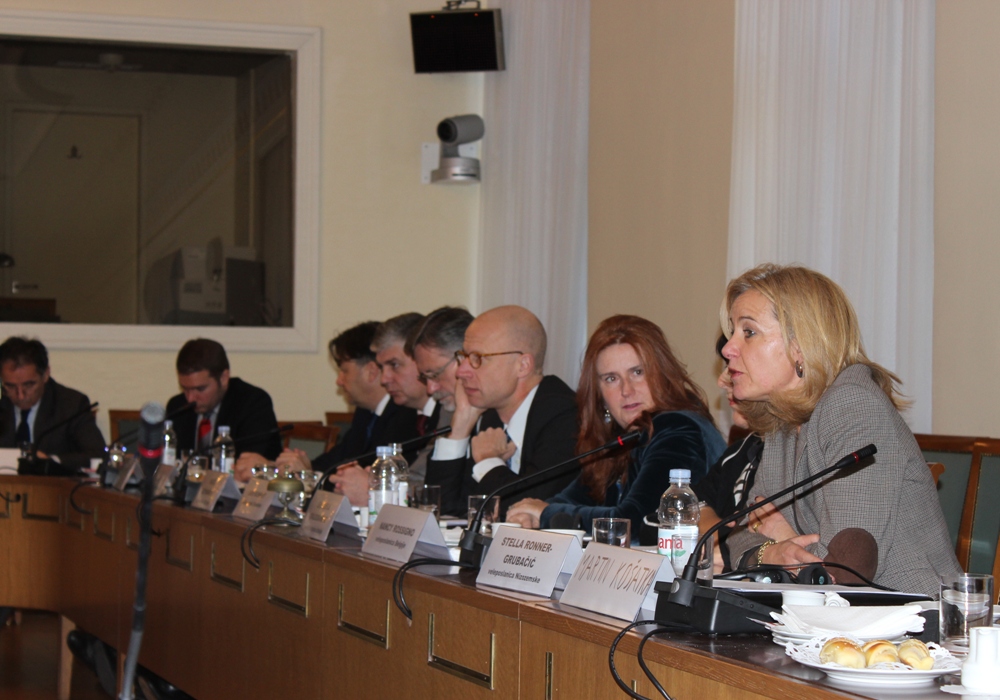On December 10, 2013 – the international Human Rights Day – a round table entitled „European Wealth of Multilingualism: Quo vadis, Croatia?“ was held in the Croatian Parliament. The round table sent out a clear message from parliamentary representatives, civil society activists and Ambassadors of seven European countries that multilingualism is a treasure that Europe cultivates and takes pride in.
Multilingualism is an imperative of Europe’s cultural identity, as the continent is extremely linguistically diverse. Many languages are simultaneously majority languages and, elsewhere, minority idioms. The protection of each individual’s inalienable right to his/her own speech, as well as encouragement to intercultural contact and exchanges between speakers of various languages, are the guiding ideas of the European Charter for Regional or Minority Languages, binding to Croatia since 1997.
Furio Radin, parliamentary representative of the Italian minority and president of the Parliamentary Committee on Human Rights and National Minorities, opened the round table by stating that „whether written in Latin or in Cyrillic script, Vukovar is the same city“. Referring to his personal experience of being born and raised in a bilingual environment – one experiencing conflict but able to overcome it – he added: „Someone will always make sure that old wounds remain open, since there is never a lack of salt to be rubbed in them, but a city and community that hold their identity dear will find ways of settling their differences“.
The Ambassadors of Hungary, Italy, the Czech Republic, the Netherlands, Belgium, Poland and Sweden then presented their respective countries’ practices and challenges in the promotion of minority languages, demonstrating that, in spite of different approaches, there is a unifying commitment to cooperation with other countries with the goal of preserving linguistic diversity.
As activist Eugen Jakovčić stated on behalf of Platform 112, the initiative for a referendum that would limit the right to minority languages and writing systems only to those municipalities where a national minority makes up a majority of the population, is fundamentally opposed to principles and good practices throughout Europe, runs contrary to policies that Croatia is obliged to implement and is detrimental to the state’s ability to advocate interests of Croatian national minorities in other countries.
During the round table, data from the Croatian Government’s October 2013 Report to the Council of Europe were presented. According to this source, minority languages in Croatia (Hungarian, Serbian, Czech, Slovak and Italian) are used in 26 municipalities based on a 30% minimum population quota prescribed by the Constitutional Act on the Rights of National Minorities. An additional 30 municipalities are bilingual by virtue of their respective statutory provisions, enabling smaller minority populations the use of their languages. Human rights activists have warned that the possible deterioration of minority languages’ legal protection, by means of introduction of a 50% minimum population quota, would severely impair the rights of the Italian, Czech and Hungarian communities, in addition to sending out a disgraceful message to both the Croatian society and Europe in general – that minority languages in Croatia are treated not as cultural wealth but as a necessary evil.
The round table was organized as part of the “ALL OF US – for a Croatia for us all” civic campaign, launched by the Platform 112 civil society coalition and the Civic Committee for Human Rights. The Parliamentary Committee on Human Rights and National Minorities endorsed the event.
In its Appeal on behalf of Reason – for a Croatia for us all, the campaign states that expressions of intolerance towards a minority and the symbols of its cultural identity limit the freedoms, rights and safety of Croatian citizens, including the members of the majority group, by persuading them that these “Others” pose a constant and nefarious threat.
